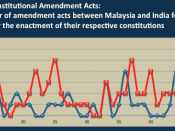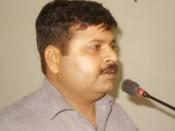When I was a youngster in elementary school, the daily reading of a passage from the Bible was a practice as much a part of classroom proceedings as the Pledge of Allegiance. The U.S. Supreme Court, ruling upon a suit challenging the constitutionality of the practice,rendered an opinion declaring it, indeed, unconstitutional. It was a very unpopular decision with many Americans, and in recent years there has been a growing clamor to change it. Instigated in large measure by conservative and fundamentalist Christian groups, the drive for a constutional amendment to bring back religion in the classrooms (make no mistake, it is no less a proposal than that) is full steam ahead. I, for one, oppose the roposed amendment because I am firmly of the opinion a constitutional amendment requiring prayer in the public schools would contravene the intent of the constitution's framers, subject the impressionable minds of young children to undue pressures and would be the foot in the door to further assaults on constitutional safeguards that are a bulwark against an intolerant, all-powerful state.
"Congress shall make no law respecting an establishment of religion, or prohibiting the free exercise thereof..." With those words of the first amendment to the constitution, the framers of that document spelled out their vision of what they wanted the republic to be. It was a vision born out of the experiences of those who knew too well what it was like to be in bondage to laws that compelled them to support government-favored churches, a practice that
prevailed in the old world and was transplanted to the soil of colonial America. Quoting from the opinion of the Supreme Court as delivered by Mr. Justice Black in the case of Everson vs. Board of Education, 330 U.S. 1 1947), "...in efforts to...


